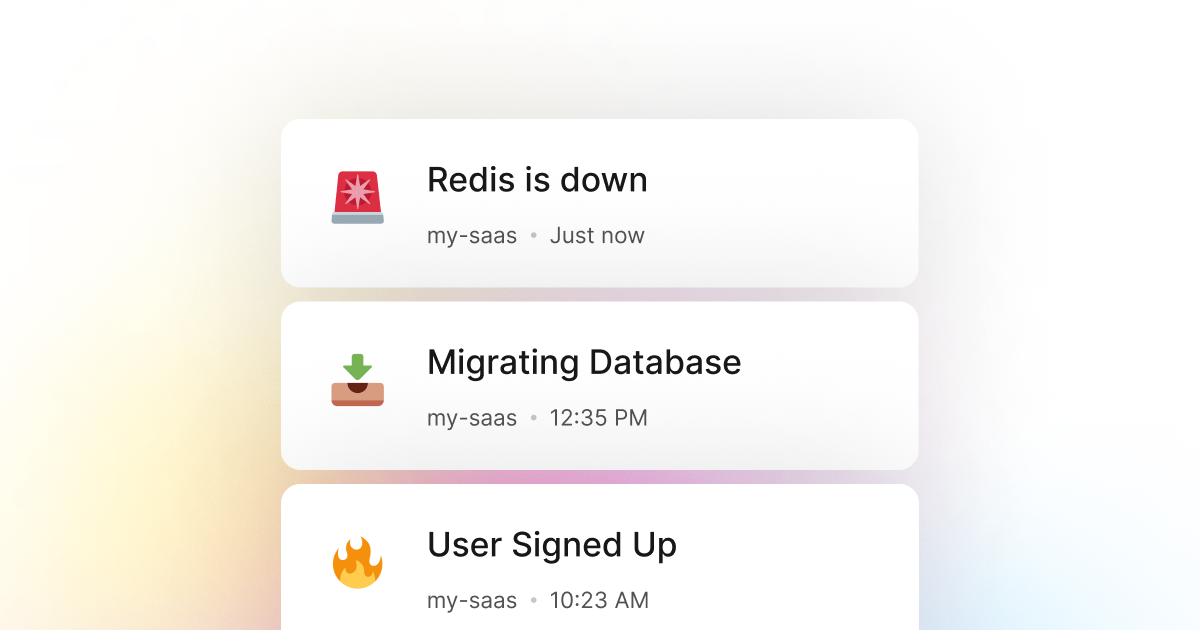We all know that Redis is a powerful in-memory data structure store, used as a database, cache, and message broker. Here at LogSnag, we commonly use Redis in our backend services to store it as our primary cache layer to improve the performance of our compute-intensive workloads.
However, just like any other service, Redis is not immune to downtime and outages. In fact, there are dozens of reasons why Redis can go down, including: network issues, hardware failures, and even human errors. In many cases, Redis downtime can be a critical issue causing degraded performance or even complete service outages. Resulting in a bad user experience or even loss of revenue.
Therefore, it is important to monitor Redis downtime in your application to ensure that your users are not affected by any downtime or outages. Fortunately, LogSnag makes it trivial to track such events and makes it easy for our team to monitor when Redis goes down.
With LogSnag, we can easily track the downtime of Redis and any other service in our application. The way we handle this is by watching the status of our Redis connection in our application. If the service is down, we instantly trigger an event to LogSnag. This allows our team to instantly be notified when Redis goes down and take the necessary steps to resolve the issue.
Setting up LogSnag
- Sign up for a free LogSnag account.
- Create your first project from the dashboard.
- Head to settings and copy your API token.
Objective-C code snippets
To track your Redis downtime, you can use the following code snippet
Please don't forget to replace the YOUR_API_TOKEN with your API token and update the project and channel names.
Using Objective-C with NSURLSession
Objective-C integration details
LogSnag is a powerful, real-time event tracking tool that works seamlessly with Objective-C. With LogSnag, you can set up event tracking for anything important to your team and monitor them in real-time.
In addition, you can set up custom charts, insights, and dashboards to visualize your data and make it easy to understand. LogSnag also provides powerful features such as cross-platform push notifications, event filtering, user and product journeys, and more.
LogSnag provides a generous free plan to get you started with event tracking. You can also check out our pricing page to see our paid plans. So please give us a try and let us know what you think!
Other use-cases for LogSnag
- Monitor your CI/CD build status for your Objective-C application
- Monitor your CPU usage in your Objective-C application
- Monitor when database goes down in your Objective-C application
- Monitor high disk usage in your Objective-C application
- Monitor when a user changes their email address in your Objective-C application
- Monitor failed logins in your Objective-C application
- Monitor failed payments for your Objective-C application
- Monitor memory usage in your Objective-C application
- Monitor MySQL downtime in your Objective-C application
- Monitor when a new feature is used in your Objective-C application
- Monitor your Postgres downtime in your Objective-C application
- Monitor suspicious activity in your Objective-C application
- Monitor when a user exceeds the usage limit for your Objective-C service
- Monitor when a user is being rate limited in your Objective-C application
- Get a notification when your Objective-C code is done executing
- Send push notifications to your phone or desktop using Objective-C
- Track canceled subscriptions in your Objective-C application
- Track your Objective-C cron jobs
- Track when a file is uploaded to your Objective-C application
- Track when a form is submitted to your Objective-C application
- Track payment events via Objective-C
- Track user sign in events in Objective-C
- Track user signup events via Objective-C
- Track waitlist signup events via Objective-C

